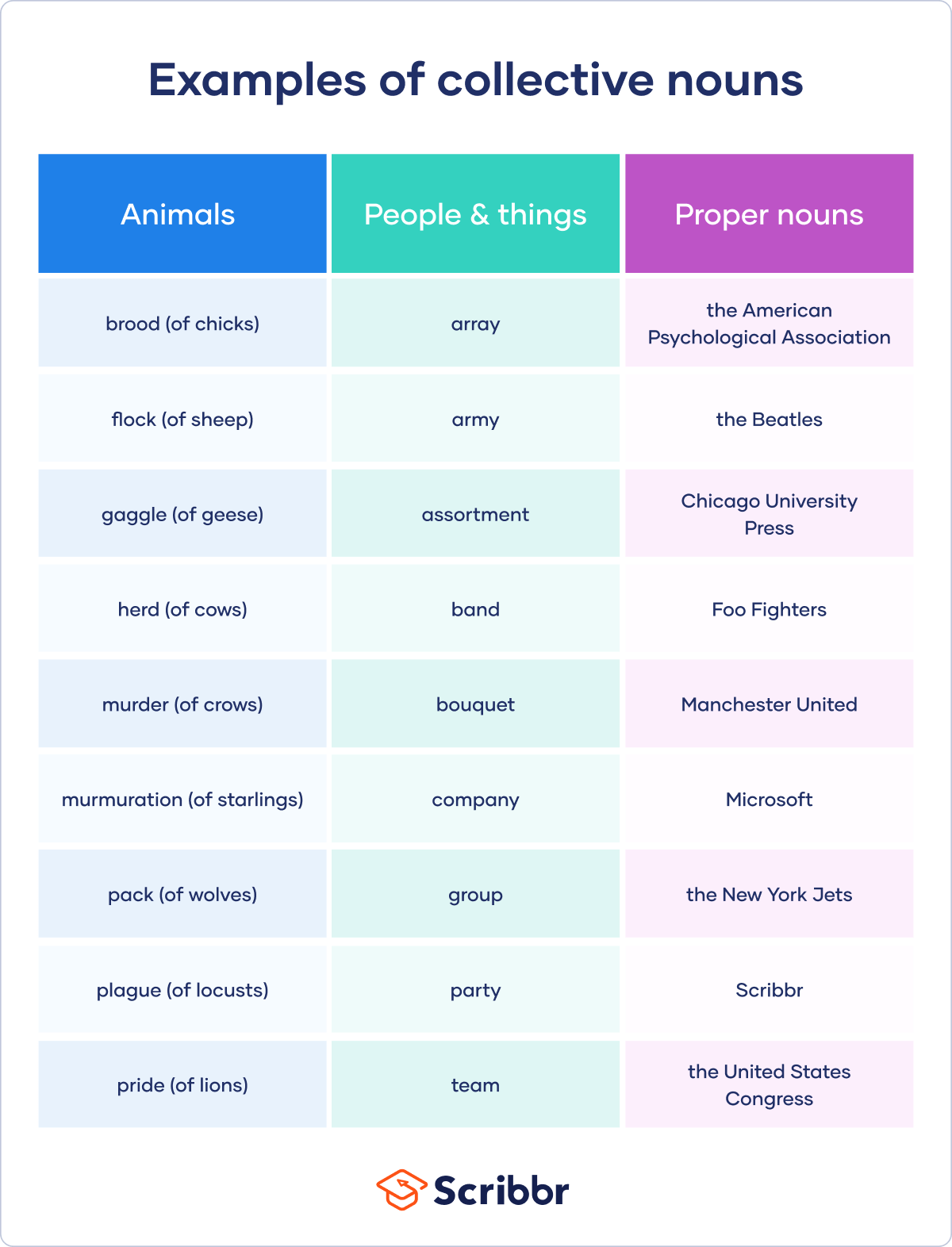What Is a Collective Noun? | Examples & Definition
A collective noun is a noun that refers to some sort of group or collective – of people, animals, things, etc. Collective nouns are normally not treated as plural, even though they refer to a group of something.
Collective nouns include common nouns like ‘group’ and proper nouns like ‘Google’ or ‘The Rolling Stones’.
A flock of sheep is crossing the road, delaying motorists.
The Beatles broke up when Paul McCartney quit the band.
Are collective nouns singular or plural?
Collective nouns are most commonly treated as singular (i.e., used with singular verb forms like ‘is’), but usage varies between US and UK English:
- In US English, it’s standard to always treat collective nouns as singular.
- In UK English, either way is acceptable, and usage tends to vary depending on the context.
US English: Always singular
In US English, it’s regarded as incorrect to use a plural verb form with a collective noun. This doesn’t mean that people never do so, but it would be against the rules of most American style guides.
In formal and academic writing, therefore, you should be careful to treat collective nouns as singular, even when they are plural in appearance (e.g., some band names).
Foo Fighters is an overrated band.
UK English: Context-dependent
In UK English, usage is more varied, and both styles are generally seen as acceptable. In practice, the plural form tends to be used quite often when the emphasis is on the individual members of a group acting separately, or when the noun is plural in appearance.
It’s still a good idea to be consistent about how you treat each term, though. For example, it would read strangely to treat the word ‘company’ as singular in one sentence and plural in the next.
Foo Fighters are an overrated band, but Nirvana is great.
Collective nouns for animals
Many collective nouns are very general in their usage (e.g., you can refer to a ‘group’ of just about anything), but there are also much more specific collective nouns, particularly for different types of animals. These terms are used on their own or with the animal specified (e.g., ‘pack of dogs’).
These nouns range from the conventional to the poetic and unusual. The more surprising ones tend not to be used very often in practice, except to comment on their strangeness. Some examples are shown in the table below.
| Collective noun | Animals it’s used for |
|---|---|
| Brood | Baby animals such as chicks or insect larvae |
| Colony | Social and cooperative animals (e.g., ants, beavers, penguins) |
| Flock | Animals guided by a leader (e.g., sheep following a shepherd) or assembled in a formation (e.g., birds) |
| Gaggle | Geese, and sometimes other birds |
| Herd | Animals (e.g., cows) kept by farmers in a large group, or wild animals that congregate in groups |
| Labour | Moles |
| Murder | Crows |
| Murmuration | Starlings |
| Pack | Wild or trained animals that hunt as a group (e.g., wolves, dogs) |
| Parliament | Owls, and sometimes other birds |
| Plague | Locusts |
| Shrewdness | Apes |
| Unkindness | Ravens |
Examples of collective nouns
The table below shows a selection of collective nouns used to label animals, people, things, and organisations.
Frequently asked questions about collective nouns
- What is the definition of a collective noun?
-
A collective noun is any noun that is used to name a group of something (people, animals, things, etc.). ‘Group’ is one very common collective noun. Collective nouns can be common nouns (like ‘group’) or proper nouns (like ‘Google’ and other company names).
- Are collective nouns singular or plural?
-
Collective nouns are most commonly treated as singular (e.g., ‘the herd is grazing’), but usage differs between US and UK English:
- In US English, it’s standard to treat all collective nouns as singular, even when they are plural in appearance (e.g., ‘The Rolling Stones is …’). Using the plural form is usually seen as incorrect.
- In UK English, collective nouns can be treated as singular or plural depending on context. It’s quite common to use the plural form, especially when the noun looks plural (e.g., ‘The Rolling Stones are …’).
- What’s the difference between common and proper nouns?
-
Common nouns are words for types of things, people, and places, such as ‘dog’, ‘professor’, and ‘city’. They are not capitalised and are typically used in combination with articles and other determiners.
Proper nouns are words for specific things, people, and places, such as ‘Max’, ‘Dr Prakash’, and ‘London’. They are always capitalised and usually aren’t combined with articles and other determiners.
Sources for this article
We strongly encourage students to use sources in their work. You can cite our article (APA Style) or take a deep dive into the articles below.
This Scribbr articleCaulfield, J. (2023, May 23). What Is a Collective Noun? | Examples & Definition. Scribbr. Retrieved 9 December 2024, from https://www.scribbr.co.uk/nouns/collective-noun/
Aarts, B. (2011). Oxford modern English grammar. Oxford University Press.
Butterfield, J. (Ed.). (2015). Fowler’s dictionary of modern English usage (4th ed.). Oxford University Press.
Garner, B. A. (2016). Garner’s modern English usage (4th ed.). Oxford University Press.




